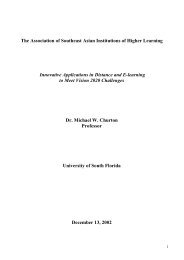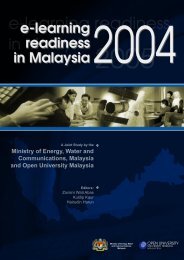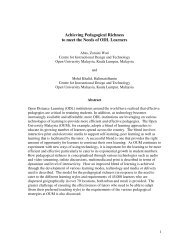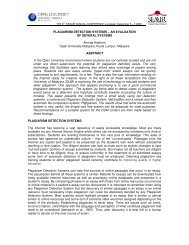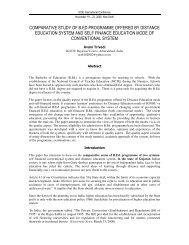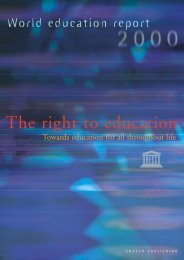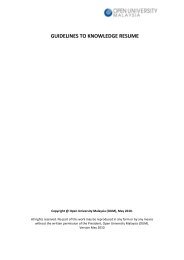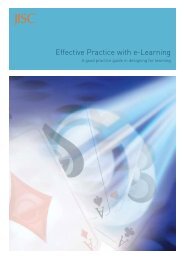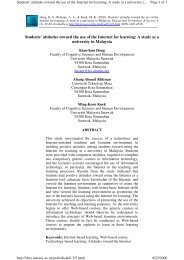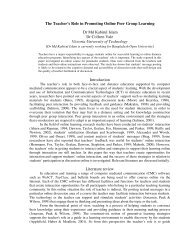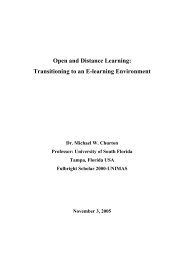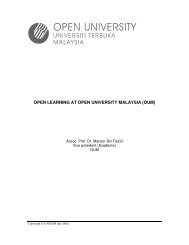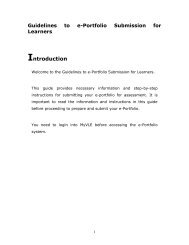lifelong learning and distance higher education - Asia Pacific Region
lifelong learning and distance higher education - Asia Pacific Region
lifelong learning and distance higher education - Asia Pacific Region
- No tags were found...
You also want an ePaper? Increase the reach of your titles
YUMPU automatically turns print PDFs into web optimized ePapers that Google loves.
REFERENCESMiddlehurst, Robin. (2001). Quality Assurance Implications of New Forms of HigherEducation: ENQA Occasional Papers 3. Helsinki, Finl<strong>and</strong>: Mulitprint.The Council on Higher Education Accreditation (CHEA). (2002). Accreditation <strong>and</strong>Assurance Quality in Distance Learning. CHEA Monograph Series 2002,Number 1. Washington, DC, USA.Notes1. This project is co-ordinated by the UNESCO Division of Higher Education at UNESCOHeadquarters <strong>and</strong> builds on collaboration with the UNESCO Sector for Communications<strong>and</strong> Information <strong>and</strong> the UNESCO International Institiute for Educational Planning for itsmanagement. It is implemented through UNESCO Field Offices in Bangkok <strong>and</strong> Harare <strong>and</strong>the UNESCO Institute for Information Technologies in Education in Moscow.2. This project is one response of UNESCO to meet the challenges of globalisation on <strong>higher</strong><strong>education</strong>. Other responses include the UNESCO/OECD Guidelines on quality provisionof cross-border <strong>higher</strong> <strong>education</strong> <strong>and</strong> the UNESCO Global Forum on International QualityAssurance, Accreditation <strong>and</strong> the Recognition of Qualifications.3. Cross-border providers are <strong>higher</strong> <strong>education</strong> institutions that are based in a country other thanthe one where they are providing <strong>higher</strong> <strong>education</strong>. Often these <strong>higher</strong> <strong>education</strong> institutionsoperate outside the national <strong>higher</strong> <strong>education</strong> system in the country where they are providing<strong>higher</strong> <strong>education</strong>.4. In the recent drafting process for the UNESCO/OECD Guidelines for quality cross-border<strong>higher</strong> educarion, a main concern highlighted by UNESCO Member States was the quality of<strong>higher</strong> <strong>education</strong> offered through electronic delivery.5. The Council on Higher Education Accreditation (CHEA) defines Quality Assurance as “theplanned <strong>and</strong> systematic review process of an institution or [programme] to determine thatacceptable st<strong>and</strong>ards of <strong>education</strong>, scholarship, <strong>and</strong> infrastructure are being maintained <strong>and</strong>enhanced. This usually includes expectations that mechanaisms of quality control are in place<strong>and</strong> effective”.6. 31C/4 UNESCO Medium-Term Strategy available at: http://unesdoc.unesco.org/images/0012/001254/125434e.pdf.7. Approved 31C/4 UNESCO Medium-Term Strategy 2002-2007 available at: http://unesdoc.unesco.org/images/0012/001254/125434e.pdf.THE CONTRIBUTORZeynep VarogluDeputy Team Leader, CCT Project, UNESCO Higher Education Open <strong>and</strong>Distance Learning Knowledge BaseAssistant Programme Specialist, Division of Higher EducationUNESCOE-mail: Z.Varoglu@unesco.org105



